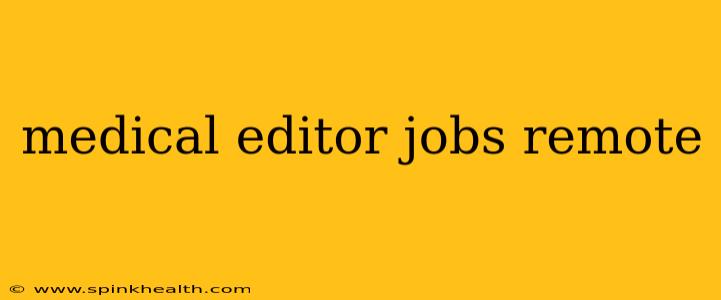The hum of the coffee machine, the gentle purr of your cat, the quiet focus of your home office – this could be your reality as a remote medical editor. This increasingly popular career path offers the flexibility of working from home, combined with the intellectual stimulation and significant impact of shaping vital medical information. But how do you break into this field, and what exactly does the job entail? Let's explore.
What Does a Remote Medical Editor Do?
Imagine yourself as a crucial link in the chain ensuring accurate and accessible medical information reaches patients and healthcare professionals. That's the essence of a medical editor's role. A remote medical editor performs the same tasks as their office-based counterparts, just from the comfort of their home. These tasks often include:
- Editing and proofreading medical manuscripts: This involves checking for accuracy, clarity, consistency, and adherence to style guides. It's about ensuring the information is not just grammatically correct but also medically sound and easily understood.
- Fact-checking: This is a crucial aspect of the job. Medical editors meticulously verify data, statistics, and references to ensure the information is up-to-date and reliable.
- Working with authors: Medical editors collaborate closely with authors, offering constructive feedback, guiding revisions, and helping refine their writing to ensure clarity and precision. This often requires excellent communication and diplomacy.
- Ensuring compliance: This includes adhering to ethical guidelines, copyright laws, and publication standards. Medical information is sensitive, and maintaining integrity is paramount.
- Managing projects: This could involve coordinating with other editors, keeping track of deadlines, and overseeing the entire editorial process.
What Skills Do I Need for a Remote Medical Editor Job?
While a formal background in medicine isn't always mandatory, a strong foundation in science and excellent writing skills are essential. Here's a breakdown of key requirements:
- Advanced editing and proofreading skills: A keen eye for detail is crucial, as is a deep understanding of grammar, style, and punctuation.
- Medical terminology and knowledge: A strong grasp of medical terminology is essential for understanding and accurately editing medical content.
- Exceptional communication skills: Working remotely often requires collaborating with authors and colleagues through email, video conferencing, and other digital platforms. Strong communication is key to effective collaboration and project management.
- Organizational and time-management skills: Balancing multiple projects, meeting deadlines, and managing workload effectively is critical, especially when working independently.
- Familiarity with medical style guides: Different publications have varying style guides. Familiarity with AMA, Chicago, or other relevant style guides is a significant advantage.
How Do I Find Remote Medical Editor Jobs?
Finding remote medical editor positions often requires a proactive approach. Here are some strategies:
- Job boards: Websites like Indeed, LinkedIn, and Monster often list remote medical editor opportunities. Specify "remote" in your search terms.
- Company websites: Check the career pages of medical publishers, journals, and research institutions. Many now offer remote positions.
- Networking: Connect with medical editors and professionals on LinkedIn and other professional platforms. Networking can lead to unadvertised opportunities.
- Freelance platforms: Sites like Upwork and Fiverr may have clients seeking remote medical editors. This can be a good starting point, allowing you to build experience and a portfolio.
What are the Salary Expectations for Remote Medical Editors?
Salary for remote medical editors varies based on experience, location, and employer. Entry-level positions may offer lower salaries, while experienced editors can earn significantly more. Researching salary ranges on websites like Glassdoor or Payscale can give you a better understanding.
What are the Advantages and Disadvantages of Being a Remote Medical Editor?
Advantages:
- Flexibility: Work from anywhere with a reliable internet connection. Set your own hours (within reason, depending on deadlines).
- Work-life balance: Improved control over your schedule can lead to a better work-life balance.
- Cost savings: Reduced commuting costs and the potential to work from a more affordable location.
Disadvantages:
- Isolation: Working alone can lead to feelings of isolation, so it's important to maintain strong social connections and actively seek opportunities for professional interaction.
- Self-discipline: Successful remote work requires strong self-discipline and the ability to manage your time effectively.
- Technology reliance: You'll need reliable internet and technology to perform your duties effectively.
Are there different types of remote medical editing jobs?
Yes, the field offers diverse opportunities. You could specialize in specific areas like pharmaceutical editing, clinical trial reporting, or medical journal editing. Some editors focus on general medical editing, while others might specialize in a particular medical niche. The level of experience and expertise required often dictates the type of roles available.
Becoming a remote medical editor requires dedication, skill, and a genuine passion for accurate medical communication. However, the rewards – both professional and personal – make it a career path worth pursuing. By carefully considering your skills and proactively searching for opportunities, you can successfully navigate the path towards a rewarding remote career in medical editing.

